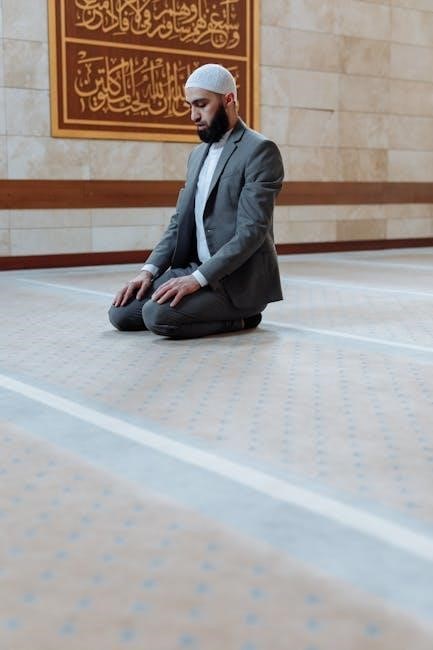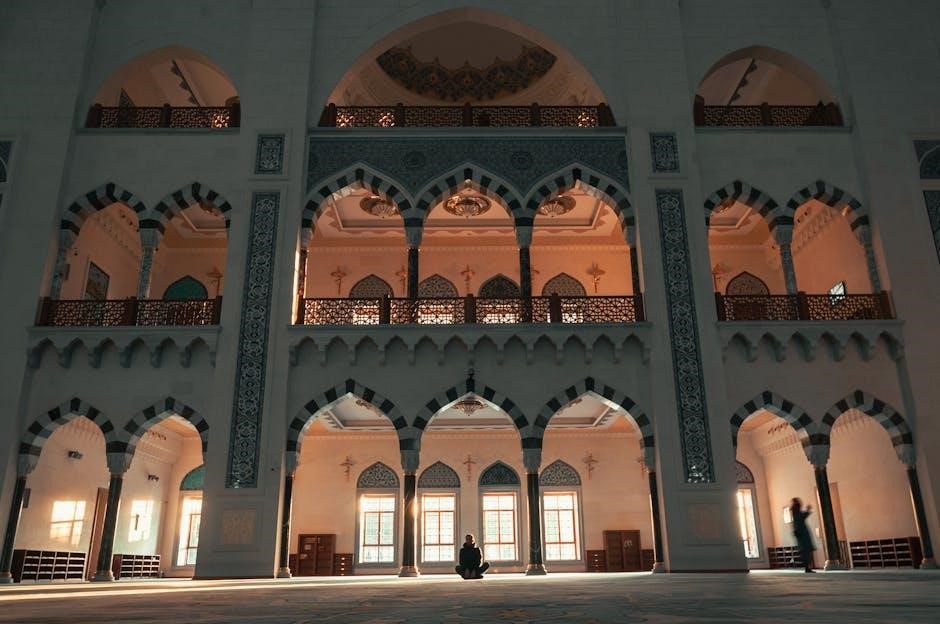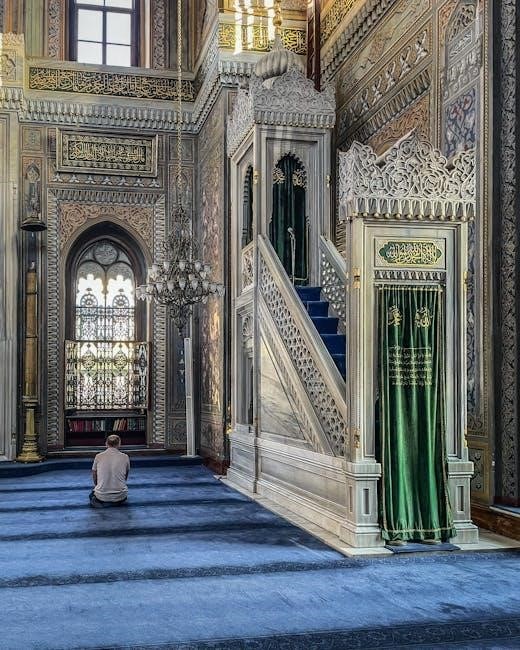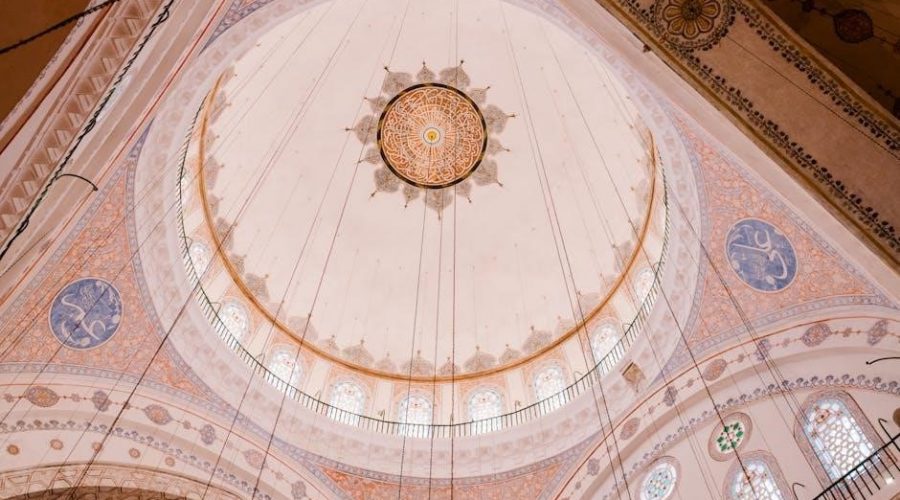Prayer (Salah) is a fundamental act of worship in Islam‚ connecting believers directly with Allah. It involves physical and spiritual components‚ performed five times daily: Fajr‚ Dhuhr‚ Asr‚ Maghreb‚ and Isha. Each prayer has specific steps and recitations‚ emphasizing purity and mindfulness. Guidance for beginners is available through resources like PDF guides and mosque materials‚ ensuring proper etiquette and understanding.
Importance of Prayer in Islam
Importance of Prayer in Islam
Prayer (Salah) is a cornerstone of Islam‚ fulfilling a spiritual‚ emotional‚ and social role. It strengthens the connection with Allah‚ fostering humility‚ gratitude‚ and self-refinement. As the second pillar of Islam‚ Salah is obligatory for all Muslims‚ establishing a direct link with the Almighty. It provides guidance‚ peace‚ and a structured routine‚ helping believers navigate life’s challenges. Prayer also serves as a means of seeking forgiveness and attaining spiritual growth. By following the Prophet Muhammad’s (PBUH) example‚ Muslims emulate his devotion‚ ensuring their worship aligns with divine teachings. Salah unites the Muslim community‚ reinforcing faith and discipline.
Basic Overview of the Five Daily Prayers
The five daily prayers in Islam are obligatory acts of worship performed at specific times: Fajr (dawn)‚ Dhuhr (noon)‚ Asr (afternoon)‚ Maghreb (sunset)‚ and Isha (night). Each prayer consists of a set number of Rak’ahs (units)‚ ranging from two to four‚ and involves specific movements and recitations. These prayers are a direct connection to Allah‚ providing a structured routine that fosters spiritual balance and mindfulness. They are performed facing the Qiblah (direction of the Ka’bah in Makkah) and include elements like the Takbir (Allahu Akbar) and the Tashahhud. Consistency in these prayers is highly emphasized‚ as they are a fundamental pillar of Islam.

Purification Before Prayer (Wudu)
Wudu is a purification ritual essential before prayer‚ involving specific steps to cleanse the body and mind‚ ensuring readiness for worship. It is a fundamental Islamic practice.
Step-by-Step Guide to Performing Wudu
Performing Wudu involves a series of precise steps to attain physical and spiritual cleanliness. Begin by declaring the intention in the heart. Wash the hands three times‚ then rinse the mouth and nose. Clean the face thoroughly‚ ensuring to cover the entire area from the forehead to the chin and ear to ear. Next‚ wash the arms up to the elbows three times. Wipe the head‚ including the ears‚ and clean the neck‚ followed by washing each foot up to the ankles. Each step must be done with care to ensure validity. Proper sequence and attention to detail are crucial.
Importance of Cleanliness in Islam
Cleanliness (Taharah) is a cornerstone of Islamic practice‚ essential for both physical and spiritual purity. It is emphasized that “cleanliness is half of faith.” Before prayer‚ Muslims must ensure their body‚ clothing‚ and prayer area are clean. This reflects the respect and dignity of worship. Proper hygiene fosters a mindful and humble state‚ preparing one to connect with Allah. The Prophet Muhammad (peace be upon him) stressed the importance of cleanliness‚ making it a fundamental aspect of daily life and worship. This principle extends beyond prayer‚ influencing all acts of devotion and community interactions.
What Invalidates Wudu and How to Fix It
Wudu is invalidated by natural discharges (e.g.‚ urine‚ stool‚ gas)‚ deep sleep‚ or physical contact with the opposite gender. Eating camel meat or actions that nullify ablution also break it. To restore Wudu‚ one must repeat the purification process‚ ensuring all steps are correctly performed. Awareness of these factors helps maintain validity‚ enabling worshipers to pray with confidence. Immediate renewal of Wudu is essential to preserve the state of purity required for prayer and other acts of worship in Islam.
The Five Daily Prayers in Islam
The five daily prayers—Fajr‚ Dhuhr‚ Asr‚ Maghreb‚ and Isha—are the cornerstone of worship in Islam. Performed at specific times‚ they strengthen spiritual connection.
Fajr Prayer (Dawn Prayer)
Fajr‚ the first of the five daily prayers‚ is performed before sunrise. It consists of two rak’ahs (units) and is a time of tranquility‚ fostering spiritual renewal. The Prophet Muhammad (peace be upon him) emphasized its importance‚ as it marks the start of the day with worship. Many Muslims also perform optional Sunnah prayers before Fajr‚ further enhancing its significance. Observing Fajr is considered a sign of dedication and commitment to faith‚ as it requires waking up early. Consistency in Fajr prayer is highly rewarded‚ making it a cornerstone of a Muslim’s daily routine. Learn more here.
Dhuhr Prayer (Noon Prayer)
Dhuhr‚ the second daily prayer‚ is performed at noon when the sun is at its highest point. It consists of four obligatory rak’ahs‚ preceded by optional Sunnah prayers. The Prophet Muhammad (peace be upon him) emphasized its importance‚ as it falls during a busy time of the day‚ testing one’s commitment to worship. Many Muslims find it challenging to pause for Dhuhr‚ making it a significant act of faith. Performing Dhuhr with focus and sincerity is highly rewarding‚ as it reflects a Muslim’s dedication to prioritizing worship over worldly engagements. Learn more here.
Asr Prayer (Afternoon Prayer)
Asr‚ the third daily prayer‚ is performed in the late afternoon before the sun reaches its setting point. It consists of four obligatory rak’ahs‚ with optional Sunnah prayers beforehand. Asr holds great significance‚ as the Prophet Muhammad (peace be upon him) described it as a prayer beloved to Allah. For beginners‚ it’s important to maintain focus during the recitations and physical movements. Performing Asr with patience and mindfulness is crucial‚ especially as it falls during a busy part of the day. Many find it a spiritual anchor‚ helping them reconnect with Allah amidst daily responsibilities. Learn more.
Maghreb Prayer (Sunset Prayer)
Maghreb‚ the fourth daily prayer‚ is performed at sunset‚ marking the end of the day. It consists of three obligatory rak’ahs‚ with optional Sunnah prayers before and after. For beginners‚ it’s essential to learn the timing‚ which begins immediately after sunset and ends before the stars appear. Maghreb holds unique significance as it transitions the believer from day to night‚ emphasizing reflection and gratitude. Proper focus during the prayer is encouraged‚ as distractions are common due to the evening rush. Learn more about its structure and spiritual benefits.
Isha Prayer (Night Prayer)
Isha is the fifth and final daily prayer‚ performed at night after sunset. It consists of four obligatory rak’ahs‚ with optional Sunnah prayers before and after. Beginners should focus on proper timing‚ as Isha begins after Maghreb and ends before midnight. The prayer includes recitations of Surah Al-Fatihah and other Quranic verses‚ fostering a deep connection with Allah. Isha is a time for reflection‚ especially in the stillness of the night‚ encouraging believers to seek forgiveness and prepare for the day ahead. Learn more about its spiritual significance.

Additional Prayers and Their Significance
Additional prayers‚ like Jumu’ah‚ Eid‚ and Tarawih‚ hold unique spiritual and communal value‚ enhancing devotion and fostering unity among believers. They complement the five daily prayers beautifully. Learn more.
Jumu’ah Prayer (Friday Prayer)
Jumu’ah‚ or Friday Prayer‚ is a vital congregational prayer replacing the Dhuhr prayer for men. It includes a sermon (khutbah) and two rak’ahs‚ emphasizing community and spiritual rejuvenation. The khutbah addresses moral guidance‚ fostering unity among believers. Attendance is obligatory for men‚ while women may attend. Special supplications and recitations enhance its significance. Resources like PDF guides provide detailed instructions‚ helping beginners understand its structure and etiquette. Jumu’ah is a cornerstone of Islamic communal worship‚ strengthening faith and social bonds. Learn more.
Maghreb Prayer and Its Unique Aspects
Maghreb Prayer‚ performed at sunset‚ is the fourth daily prayer with three rak’ahs. It begins immediately after sunset and is characterized by a unique recitation of the Quran. The first rak’ah includes a loud recitation of Surah al-Fajr or other designated surahs‚ while the second and third are prayed silently. Its timing coincides with the breaking of the fast during Ramadan‚ adding spiritual significance. PDF guides for beginners detail its structure‚ emphasizing the importance of punctuality and focus. Maghreb prayer connects believers in gratitude for the day’s blessings and transitions into evening reflection.
Eid Prayers and Their Special Procedures
Eid prayers are unique‚ performed during the two Islamic festivals: Eid al-Fitr and Eid al-Adha. These prayers are not part of the regular five daily prayers and are typically performed in congregation. The prayer consists of two rak’ahs with additional takbirs (praise to Allah). In the first rak’ah‚ seven takbirs are recited‚ and in the second‚ five‚ excluding the initial takbir. A khutbah (sermon) follows‚ emphasizing gratitude and celebration. Eid prayers are festive‚ often held in open spaces‚ and include specific supplications for blessings. PDF guides detail these procedures‚ helping beginners understand and participate meaningfully in these joyous acts of worship.

Congregational Prayer (Salah in Jama’ah)
Congregational prayer fosters unity and equality among Muslims‚ performed in a mosque or open space. It encourages group worship‚ enhancing spiritual connection and solidarity within the Muslim community.
Benefits of Praying in Congregation
Praying in congregation strengthens spiritual bonds and fosters a sense of unity. It multiplies the rewards of prayer and promotes equality among believers. Congregational prayer also enhances discipline and provides a supportive environment for learning proper etiquette and technique. Many resources‚ like PDF guides‚ highlight these benefits‚ encouraging beginners to participate. This collective worship not only deepens one’s connection with Allah but also strengthens the community‚ making it a vital part of Islamic practice for all Muslims‚ regardless of their proficiency level.
Etiquette for Praying in a Mosque
When praying in a mosque‚ it is essential to observe proper etiquette. Dress modestly‚ remove footwear before entering‚ and ensure cleanliness. Arrive on time for prayers to avoid disruption. Avoid unnecessary conversations and maintain focus. Women and men pray in separate areas‚ respecting the mosque’s layout. After entering‚ greet others with a subtle “As-salamu alaykum.” Refrain from crossing in front of someone praying and avoid leaning on pillars or walls. These guidelines foster respect and harmony‚ ensuring a dignified environment for worship. Proper etiquette enhances the spiritual experience and reflects the teachings of Islam. Adherence is especially important for beginners learning the ropes.
Role of the Imam in Congregational Prayer
The Imam plays a vital role in congregational prayer‚ serving as the leader and guide. They ensure the prayer is performed correctly‚ reciting the Quran and leading the congregation through each step. The Imam sets the pace‚ allowing everyone to follow seamlessly. Their leadership fosters unity and harmony among worshippers. The Imam also acts as a spiritual guide‚ helping to maintain focus and adherence to Islamic principles. Their role extends beyond prayer‚ as they often provide teachings and serve as a role model for the community; The Imam’s position is one of respect and responsibility‚ enhancing the collective worship experience.

Essential Elements of Prayer
Prayer in Islam requires intention‚ facing the Qiblah‚ and performing specific acts like recitations‚ bowing‚ and prostration. Cleanliness and focus are crucial for validity and acceptance.
Intention (Niyyah) Before Starting Prayer
Intention (Niyyah) is crucial in Islamic prayer‚ setting the purpose of worship. It involves declaring which prayer you’re performing‚ ensuring sincerity and focus. This mental preparation is vital for validity‚ reflecting devotion.
Facing the Qiblah (Direction of Prayer)
Facing the Qiblah‚ the direction of the Kaaba in Mecca‚ is essential for valid prayer. Muslims worldwide align themselves toward this sacred site to unify their worship. For beginners‚ determining the Qiblah direction in their location is crucial. Tools like compasses or apps can help. Once facing correctly‚ the heart and mind should focus on Allah‚ ensuring the prayer’s spiritual connection. This act symbolizes submission to Allah and unity with the global Muslim community‚ reflecting Islam’s universal and organized nature in worship.
Basic Structure of Salah (Rak’ahs and Sujood)
Salah consists of units called Rak’ahs‚ each containing specific actions and recitations. Each Rak’ah includes standing‚ bowing (Ruku’)‚ prostrating (Sujood)‚ and sitting. Sujood‚ the act of placing the forehead‚ nose‚ knees‚ and hands on the ground‚ symbolizes humility and submission to Allah. The number of Rak’ahs varies per prayer: Fajr (2)‚ Dhuhr‚ Asr‚ and Maghreb (4 each)‚ and Isha (4). Understanding the sequence and performing each movement with focus ensures the prayer’s validity and spiritual impact‚ fostering a deep connection with Allah.
Movement and Recitation in Prayer
Prayer combines precise movements like standing‚ bowing‚ and prostrating with recitations from the Quran‚ ensuring a balance between physical and verbal acts of worship.
Step-by-Step Movements During Salah
- Begin with Takbiratul Ihram: Stand upright‚ raise hands to ears‚ and say “Allahu Akbar” to initiate prayer.
- Recite the Opening Du’a and Al-Fatihah‚ the first chapter of the Quran‚ while standing.
- Perform Ruku’: Bow deeply‚ placing hands on knees‚ and glorify Allah with phrases like “Subhana Rabbil Azim“.
- Stand upright again‚ saying “Sami Allahu liman hamidah” and “Rabbana wa lakal Hamd“.
- Descend into Sujud: Prostrate with forehead‚ nose‚ hands‚ knees‚ and toes touching the ground‚ reciting “Subhana Rabbil A’la“.
- Sit briefly between prostrations‚ then repeat the second Sujud.
- End the first Rak’ah by sitting and reciting the Tashahhud.
Each movement reflects submission to Allah‚ requiring focus and sincerity.
Essential Recitations in Prayer
In Islamic prayer‚ specific recitations are vital for spiritual connection. Begin with Al-Fatihah‚ the first chapter of the Quran‚ recited in every prayer. Additional Surahs may follow‚ varying by prayer time. The Tashahhud is recited while sitting‚ expressing praise and blessings upon the Prophet Muhammad. During prostration‚ recite Tasbeeh like “Subhana Rabbil A’la“. Conclude with Salawat‚ invoking blessings on the Prophet. These recitations differ slightly in Fajr‚ Dhuhr‚ Asr‚ Maghreb‚ and Isha prayers‚ ensuring a meaningful and structured worship experience.
Understanding the Meaning of Recitations
Comprehending the meanings of recitations in prayer enhances spiritual engagement. Al-Fatihah‚ the opening chapter‚ invokes guidance and mercy. The Tashahhud expresses gratitude and reaffirms faith. Tasbeeh during prostration glorifies Allah‚ fostering humility. Salawat honors Prophet Muhammad‚ seeking divine blessings. Understanding these meanings deepens focus and sincerity‚ transforming prayer into a heartfelt dialogue with Allah. Guides like the Beginners Guide to Salah and resources from Masjid ar-Rahmah provide insights‚ helping Muslims connect deeply with their worship.
Common Mistakes to Avoid in Prayer
Beginners often rush through prayers‚ forget steps‚ or wear improper attire. Guides like the Beginners Guide to Salah help correct these errors‚ ensuring proper focus and adherence to Islamic etiquette.
Errors in Wudu and How to Correct Them
Common mistakes in Wudu include forgetting to wash all parts thoroughly or missing the order of washing. One might also neglect to rinse the mouth or nose properly. Corrections involve ensuring each step‚ like washing the face‚ arms‚ and feet‚ is done correctly. If Wudu is invalidated‚ it must be renewed. Guides like the Step-by-Step Prayer Guide provide clear instructions to avoid such errors‚ emphasizing the importance of intention and proper technique to maintain the validity of Wudu and subsequent prayers.
Mistakes During the Prayer and Their Solutions
Common errors during prayer include improper posture‚ forgetting to recite essential verses‚ or losing focus. Solutions involve rehearsing steps beforehand and maintaining mindfulness. For instance‚ if one forgets to recite Surah Al-Fatihah‚ they should correct it immediately. Rushing through prayers can be addressed by practicing at a steady pace. Seeking guidance from scholars or using resources like the Beginners Guide to Learning How to Pray Salah helps identify and rectify mistakes‚ ensuring prayers are performed correctly and with the right intention.
Spiritual Aspects of Prayer
Prayer fosters a deep connection with Allah‚ requiring sincerity and mindfulness. It nurtures humility and gratitude‚ aligning the heart and soul with divine guidance.
Connecting with Allah Through Prayer
Prayer is a sacred act that fosters a profound connection with Allah‚ allowing believers to express gratitude‚ seek guidance‚ and find solace. Through sincere intention and mindfulness‚ worshippers cultivate humility and focus (Khushu’)‚ ensuring their hearts and minds are fully engaged. The recitation of the Quran and supplications (Du’a) deepen this spiritual bond‚ enabling Muslims to communicate directly with their Creator. Regular prayer helps believers maintain a steadfast faith‚ seeking Allah’s mercy and strength in daily life. This spiritual practice strengthens the soul‚ providing peace and clarity in one’s journey toward righteousness and closeness to Allah.

Khushu’ (Focus and Humility in Prayer)
Khushu’ is the essence of prayer‚ representing focus and humility. It involves a believer’s complete attention and presence‚ ensuring their heart and mind are fully engaged with Allah. Practicing Khushu’ means abandoning distractions and worldly thoughts‚ fostering a deep sense of reverence and submission. Beginners can cultivate Khushu’ by understanding the meanings of prayers‚ performing each step deliberately‚ and maintaining a calm demeanor. This spiritual state enhances the quality of worship‚ making prayer a transformative experience that nurtures a stronger connection with Allah and brings inner peace and fulfillment to the believer’s life through sincere devotion and mindfulness in Salah.
Dhikr and Du’a After Prayer
Dhikr and Du’a are essential practices following prayer‚ enriching the spiritual experience. Dhikr involves glorifying Allah with specific phrases‚ such as “Subhanallah” and “Alhamdulillah‚” fostering gratitude and remembrance. Du’a is personal supplication‚ where believers express needs and hopes‚ seeking Allah’s mercy and guidance. These acts deepen spiritual connection and humility‚ emphasizing the continuity of worship beyond formal prayer. Beginners are encouraged to learn common Dhikr phrases and sincere Du’a‚ fostering a meaningful dialogue with Allah and enhancing their faith journey with simple yet profound practices rooted in Islamic tradition.

Cultural and Practical Tips for Beginners
Choose a quiet‚ clean space for prayer‚ ensuring privacy and focus. Use a prayer mat and modest attire‚ respecting cultural norms. Utilize apps for accurate prayer timings and seek guidance from knowledgeable Muslims to enhance your practice and understanding of Islamic traditions effectively.
Choosing the Right Prayer Mat
Selecting a suitable prayer mat (sajjadah) is essential for comfort and focus during salah. Opt for durable‚ clean materials like cotton or rubber‚ ensuring a soft yet firm surface. Choose a size that accommodates your prostration comfortably. A simple‚ distraction-free design is ideal‚ avoiding excessive patterns. Consider portability for travel or daily use. Ensure the mat is made from permissible materials and kept clean‚ reflecting Islamic hygiene principles. A good prayer mat enhances your worship experience‚ providing a pure and dignified space for connecting with Allah.
Prayer Times and Their Calculation
Prayer times in Islam are determined by the sun’s position‚ ensuring worshippers connect with Allah at specific intervals. The five daily prayers—Fajr (dawn)‚ Dhuhr (noon)‚ Asr (afternoon)‚ Maghreb (sunset)‚ and Isha (night)—are timed based on sunrise and sunset. Fajr begins at dawn‚ Dhuhr at midday‚ Asr in the late afternoon‚ Maghreb shortly after sunset‚ and Isha before midnight. Calculation methods vary‚ using astronomical data‚ prayer apps‚ or local mosque schedules. Timings adjust with seasonal changes‚ ensuring adherence to Islamic principles. Understanding and respecting these times fosters a disciplined and spiritually fulfilling prayer routine‚ essential for a strong faith connection.
Seeking Guidance from Scholars or Elders
Seeking guidance from scholars or elders is crucial for beginners learning to pray in Islam. They provide accurate information‚ clarify doubts‚ and ensure practices align with Islamic teachings. Scholars and elders often lead workshops‚ lectures‚ or one-on-one sessions to explain prayer techniques‚ correct mistakes‚ and offer spiritual insights. Additionally‚ many mosques and Islamic centers distribute prayer guides‚ such as PDF booklets‚ to help newcomers understand the basics. Engaging with knowledgeable individuals fosters a deeper understanding of prayer and strengthens one’s faith journey‚ ensuring a strong foundation for performing salah correctly and meaningfully.
Mastering Islamic prayer is a lifelong journey requiring patience‚ practice‚ and devotion. Embrace resources like PDF guides and community support to deepen your connection with Allah.
Continuous Learning and Improvement
Learning to pray in Islam is a lifelong journey that requires dedication and continuous improvement. Seek guidance from scholars‚ elders‚ and reliable resources like PDF guides to deepen your understanding. Regularly review prayer steps‚ recitations‚ and etiquette to ensure accuracy. Reflect on your performances‚ seeking feedback to correct mistakes. Consistency in practice strengthens spiritual connection and discipline. Embrace opportunities to learn from others and grow in your faith. Remember‚ prayer is not just a physical act but a spiritual one‚ requiring intention‚ focus‚ and humility. Stay committed to refining your salah for a more meaningful worship experience.
Prayer as a Lifelong Journey
Prayer in Islam is not just a daily obligation but a lifelong journey of spiritual growth and connection with Allah. It fosters self-reflection‚ discipline‚ and humility‚ shaping one’s character and faith. As beginners progress‚ they discover the depth and beauty of salah‚ transforming it into a source of comfort and strength. Embrace prayer as a journey of continuous learning‚ where every rak’ah is an opportunity to draw closer to Allah. Cultivate mindfulness and sincerity‚ allowing prayer to become a meaningful and transformative experience that enriches your life and deepens your spiritual connection.

Resources for Further Study
For deeper understanding‚ various resources are available online‚ including PDF guides like “A Step-by-Step Prayer Guide for Muslim Men & Women” and materials from Masjid ar-Rahmah. These resources provide detailed instructions on purification‚ prayer steps‚ and essential recitations. Additionally‚ websites like MuslimSG offer comprehensive guides for beginners. Consulting credible Islamic scholars and utilizing online platforms can further enhance your knowledge. These resources ensure a well-rounded understanding of Islamic prayer‚ making them invaluable for continuous learning and spiritual growth;
